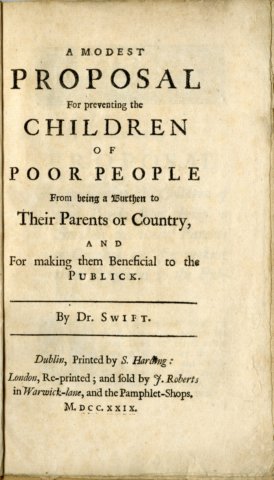Swift the Grotesque Idea
In Dr. Jonathan Swift’s writing of A Modest
Proposal, he proposes that the women of poverty sell their children to the rich
people to plump them up, so the rich can then make the children into food, also they can ” make gloves
for the ladies, and summer boots for fine gentlemen” (Swift par. 15). The less
fortunate tenants would then have another way to pay for what they need as
well. Swift writes this proposal because he feels that there are too many
children being born to poverty stricken women. While Swift’s proposal is
grotesque in nature, he makes quite an argument with his ideas of what to make out the children and how eating the children will help the economy.
 |
| Irish stew, by Charles Haynes |
Works Cited
Swift, Jonathan. A Modest
Proposal. eBook. <http://www.gutenberg.org/files/1080/1080-
h/1080-h.htm>. Feb
22,2013
Link I am going to do is definition and examples of satires.
